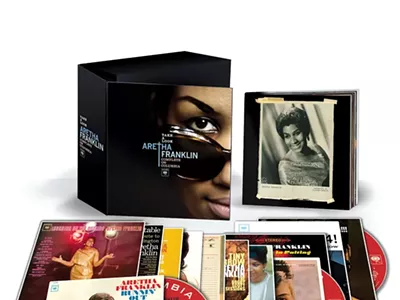Between 1966 and 1972, the Scot Richard Case (or SRC) were a major player in the Detroit rock ‘n’ roll scene. Often found at the Grande Ballroom on bills with the likes of Mitch Ryder’s Detroit Wheels, the MC5, the Stooges, Seger and the rest, the SRC looked to have made the jump to the big leagues when they were signed to Capitol Records. They released three excellent albums on that label – ‘68s SRC, ‘69s Milestones and ‘70s Traveler’s Tale - but inner turmoil lead to the band’s ultimately inevitable demise.
Now they’re back. This Saturday, the Magic Bag in Ferndale will host the first SRC show in 40 years. Bag manager Willy Wilson is delighted that the band chose his venue. “Growing up a fan of classic Detroit rock and roll, it’s a real treat to be able to do a show with the reunited SRC,” Wilson said. “To me they are one of the most overlooked groups from back in the day. People don’t realize that they had three albums released on Capitol! When Ray Goodman contacted me saying that SRC was interested in getting back together and doing a show, it was just such a no-brainer, we just said tell us when!”
With band mates Richard “Shemp” Haddad, Al Wilmot and E.G. Clawson sadly passing away since the breakup, the lineup on the night will feature Scott Richardson (vocals), Glenn Quackenbush (keyboards), Gary Quackenbush (guitar), Steve Lyman (guitar), Ray Goodman (guitar), Ralph McKee (bass) and Ralph Serafino of the Torpedos (drums). City Slang caught up with Richardson to discuss the past, present and future.
You haven’t played together for 40 years, so why now?
Because like everything else in pop culture, music is circular and at this point in time there’s a lot of interest in looking back at the particular era that we came up in, and also the SRC in particular. We realized that there’s a natural opportunity to get back together again, and if we didn’t do it now it might not happen.
Do you see Detroit groups like the Stooges, Nugent, Seger, etc, and think it could have been you?
Of course, yeah. That’s a natural reaction. Especially because I’m friends with a lot of those guys and always have been.
For a while it looked like you were the most likely to succeed. However, you do get artistic respect and Peter Gabriel is a confirmed fan. Is that enough?
It is. I’m very proud of our legacy and who we are, and also after 40 years, we stood for a lot of positive things and we’re finally getting credit for that. Rock ‘n’ roll is a circus, but I’m happy for everybody’s success. We were never jealous about anybody else, we were just happy when anybody made it. I still feel that way. But it is nice to get some recognition, absolutely.
Why do you think that period in Detroit’s history has such mystique, particularly for young people?
Well, because if you look at the actual hit records from the Summer of Love, starting with Sgt. Pepper, Are You Experienced?, and (Pink Floyd’s) The Piper at the Gates of Dawn, we were part of that. It was a once-in-a-century time period in culture. The actual youth were out in front of the establishment. For a minute there with “Like A Rolling Stone”, “Light My Fire” and stuff like that, plus the creation of FM radio, we were actually calling the shots. Or at least, calling the cultural shots. It all culminated with half a million people going to a field. That music was psychedelic. It opened another space of consciousness where people actually had a universal view of things and a world that could really change for the better. “Peace, love and understanding” was an absolute possibility as far as we were concerned. Even though we lost, that was a moment in time that was singular to our generation.
As for Detroit, you had to go back and realize that there was a great migration from the south in the ‘40s and ‘50s. People came here to work in the factories. They brought with them European musical influences, country, blues and, when I was a kid growing up in ‘50s Detroit, all that music was in the air. Music was a huge part of people’s lives in Detroit. It’s a very concentrated amount of different kinds of music, and it’s an active part of people’s lives. When the rock ‘n’ roll revolution hit, we had the added advantage of the blues and R&B thing going on. Motown sprang into existence as a worldwide phenomenon. You had Mitch Ryder and the Detroit Wheels, and great rock ‘n’ roll bands starting up in Detroit. That’s why people got onto the British invasion thing in the way that they did too.
Do you think you’ll make a new record?
Anything’s possible. We’re not trying to make a comeback as a career thing, but we would be happy to get together, do some more gigs and, yes, I personally would love to do another SRC album to dot the “I” on the whole thing.






